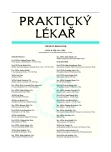-
Medical journals
- Career
Dyspnoea in elderly subjects caused by respiratory diseases
Authors: M. Doubková; J. Skřičková
Authors‘ workplace: Přednosta: prof. MUDr. Jana Skřičková, CSc. ; Klinika nemocí plicních a tuberkulózy LF Masarykovy univerzity a FN Brno
Published in: Prakt. Lék. 2010; 90(10): 589-592
Category: Reviews
Overview
Dyspnoea is a common and important symptom, not only caused by respiratory diseases. Dyspnoea is a subjective experience of absence of breathing. It arises when the respiratory system cannot fully function. Differential diagnosis of dyspnoea is extensive; we have to distinguish
– the respiratory cause of dyspnoea (chronic obstructive pulmonary disease, chronic bronchitis, bronchial asthma, pneumonia, pneumothorax, tumor, pleural effusion, interstitial lung diseases),
– cardiovascular cause (heart attack, ischemic heart disease, arrhythmia, heart failure, lung embolism), and
– other causes (otorhinolaryngology causes, metabolic acidosis, infection of central nervous system, anemia, psychogenic dyspnoea).
In elderly patients suffering from many diseases, dyspnoea is particularly caused by a combination of factors. In this situation we have to choose an interdisciplinary approach to patients. Treatment and prognosis depends on the nature of the disease causing dyspnoea.Key words:
dyspnoea, elderly, etiology, pathogenesis, diagnosis, complication, therapy, prognosis.
Sources
1. Abernethy, A.P., Wheeler, J.L., Currow, D.C. Common approach to dyspnoea management in advanced life-limiting illness. Curr. Opin. Support. Pallia. Care 2010, 4(2), p. 53-55.
2. American Thoracic Society: Dyspnea. Mechanisms, assessment, and management: a concensus statement. Am. J. Respir. Crit. Care Med. 1999, 159(1), p. 321-340.
2. Brutto, R.R., Zampa, C.C, de Oliveira, T.A. Effects of the aging process on respiratory function. Gerontology 2009, 55(5), p. 505-510.
3. Fletcher, C.M., Elmes, P.C., Fairbairn, M.B. et al. The significance of respiratory symptoms and the diagnosis of chronic bronchitis in a working population. Br. Med. J. 1959, 2, p. 257-266.
4. http://www.uzis.cz./ ÚZIS ČR (Ústav zdravotnických informací a statistiky ČR). Navštíveno dne 15. 4. 2010.
5. http://svod.cz./ Zdroj dat ÚZIS ČR. Navštíveno dne 14. 4. 2010.
6. Mahler, D.A., Selecky, P.A., Harrod, C.G. American college of chest physicians consensus statement on the management of dyspnoe in patient with advanced lung or heart disease. Chest 2010, 137(3), p. 674–691.
7. Mahler, D.A., Sierro-Carrion, G., Baier, J.C. Evaluation of dyspnoea in the elderly. Clin. Geriatr. Med. 2003, 19(1), p.19-33.
8. Musil, J., Petřík, F. (Eds). Pneumologie – příručka pro praktické lékaře. 1. vydání Praha: Galén 2000, s. 23-24.
9. Teřl, M., Krákorová, G., Pešek, M. Plicní lékařství. 1. vydání Praha: Karolinum, 2004, s. 57-58.
10. The Criteria Committee of the New York Heart Association. Nomenclature and Criteria for Diagnosis of Diseases of the Heart and Great Vessels. 9th ed. Boston, Mass: Little, Brown § Co, 1994, p. 253-256.
11. Xue, D., Abernethy, A.P. Curr. Opin. Support. Pallia. Care. 2010, 4(2), p. 85-91.
Labels
General practitioner for children and adolescents General practitioner for adults
Article was published inGeneral Practitioner

2010 Issue 10-
All articles in this issue
- Burn-out syndrome in physicians
- Measuring the quality of life of family caregivers
- Some special questions dealing with the institution of advance directives
- Professional satisfaction of physicians and nurses in general practice settings
- Alcohol consumption and its situation in the Czech Republic
- Adrenal carcinoma – pitfalls of diagnosis
- Current review of the diagnosis and treatment of pancreatic cancer
-
Evolution and evolutionary theory for physicians
X.: Self-awareness. - Continuing postgraduate education of general practitioners and E-learning in the Czech Republic
-
What should a general practitioner know about drinking water?
Part II. Health risks associated with water - Dyspnoea in elderly subjects caused by respiratory diseases
- General Practitioner
- Journal archive
- Current issue
- Online only
- About the journal
Most read in this issue- Dyspnoea in elderly subjects caused by respiratory diseases
- Burn-out syndrome in physicians
- Current review of the diagnosis and treatment of pancreatic cancer
- Continuing postgraduate education of general practitioners and E-learning in the Czech Republic
Login#ADS_BOTTOM_SCRIPTS#Forgotten passwordEnter the email address that you registered with. We will send you instructions on how to set a new password.
- Career

